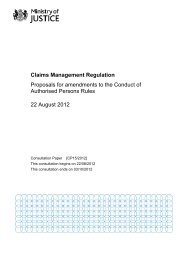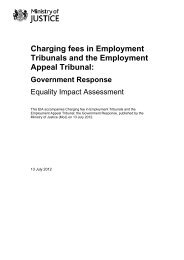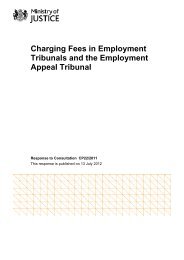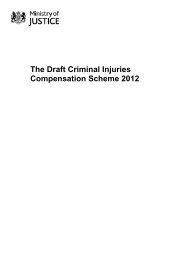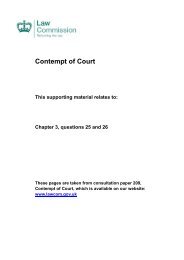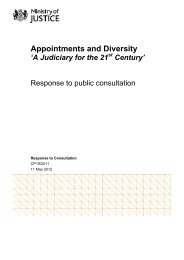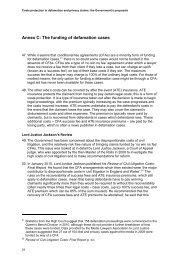Administrative Justice and Tribunals Council ... - Consultation Hub
Administrative Justice and Tribunals Council ... - Consultation Hub
Administrative Justice and Tribunals Council ... - Consultation Hub
Create successful ePaper yourself
Turn your PDF publications into a flip-book with our unique Google optimized e-Paper software.
drawn from a broad spectrum of administrative justice, who provide credibility to our role.<br />
We believe it to be essential that the functions of the AJTC - although not necessarily the<br />
organisation as presently constituted in every detail - should be retained within an<br />
independent <strong>and</strong> authoritative organisation.<br />
We challenge the Government’s proposition that AJTC functions can be discharged by MoJ<br />
civil servants, who would lack the required independence or breadth of underst<strong>and</strong>ing to<br />
fulfil our functions. The MoJ team assigned to this task is responsible for a number of other<br />
important policy areas. It is significant that this role does not feature in MoJ’s published<br />
strategic plans. It is clear that an advisory <strong>Council</strong> of sixteen experienced <strong>and</strong> wellconnected<br />
administrative justice experts, supported by a small team of experienced policy<br />
officers, cannot be replaced by less than two civil servants. Moreover, there is no evidence<br />
at all that government has considered how oversight of the wider administrative justice<br />
system will be maintained beyond MoJ’s immediate responsibilities.<br />
There is considerable scope - with the right approach - to increase efficiency in the system<br />
without damaging quality. Our recent work, on ‘Right First Time’ decision-making, on<br />
general principles for administrative justice <strong>and</strong> on proportionate dispute resolution, is all<br />
intended to promote <strong>and</strong> support a strategic approach to the serious challenges the system<br />
is facing. Our track record, the expertise <strong>and</strong> commitment of our members <strong>and</strong> our<br />
secretariat, <strong>and</strong> perhaps most importantly of all, our independence, would seem to be of<br />
crucial importance to a Government that is, of necessity, conflicted in seeking significant<br />
reform of a system of justice in which it is a party to most disputes.<br />
Timing<br />
The timing of the abolition proposal is surprising. The volume of appeals to tribunals has<br />
risen dramatically in the last few years. <strong>Administrative</strong> <strong>Justice</strong> actively engages more<br />
citizens than any other part of the justice system. The government is urgently seeking new<br />
approaches to dispute resolution - with new opportunities <strong>and</strong> new risks - to accommodate<br />
a substantial reduction in the justice budget. We believe the <strong>Council</strong> is uniquely well placed<br />
to help meet this challenge.<br />
At a time of increasing economic <strong>and</strong> social uncertainty, access to justice (<strong>and</strong> public<br />
perceptions of the justice system) matter more than ever. <strong>Administrative</strong> justice essentially<br />
exists to allow citizens – often the most dispossessed - to have proper consideration of<br />
alleged mistakes <strong>and</strong> their other grievances against the machinery of government. Without<br />
an accessible <strong>and</strong> effective administrative justice system, which binds people to wellestablished<br />
democratic values of lawfulness <strong>and</strong> fairness, there must be increased risks of<br />
social alienation. At the very time that “Fixing the broken society” has become a top priority,<br />
many will find it very strange that the Government should wish to abolish the body which is<br />
the champion <strong>and</strong> defender of the administrative justice system.<br />
AJTC particularly safeguards the interests of users - actual <strong>and</strong> potential. We have noted<br />
that the Government’s ‘Open Public Services’ White Paper, published in July, announces<br />
the intention to “examine the role of elected <strong>and</strong> unelected office-holders in championing<br />
individuals’ rights, ensuring availability of services <strong>and</strong> providing overview <strong>and</strong> scrutiny.”<br />
At the launch of the White Paper, the Prime Minister emphasised the importance to be<br />
attached to promoting the user voice in relation to public services. We believe that it would<br />
be contradictory <strong>and</strong> short-sighted to abolish the AJTC, the organisation that exists for this<br />
very purpose, before the proposed examination takes place. The White Paper refers to the<br />
Government’s wish to encourage existing champions, such as Which, to speak out on<br />
consumers’ behalf in relation to public services. Although there is undoubtedly considerable<br />
scope for Which to increase its involvement with public services, I can say with authority



